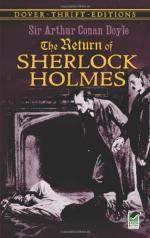But before we could move, the man had emerged again. As he came out into the glimmering patch of light, we saw that he carried something white under his arm. He looked stealthily all round him. The silence of the deserted street reassured him. Turning his back upon us he laid down his burden, and the next instant there was the sound of a sharp tap, followed by a clatter and rattle. The man was so intent upon what he was doing that he never heard our steps as we stole across the grass plot. With the bound of a tiger Holmes was on his back, and an instant later Lestrade and I had him by either wrist, and the handcuffs had been fastened. As we turned him over I saw a hideous, sallow face, with writhing, furious features, glaring up at us, and I knew that it was indeed the man of the photograph whom we had secured.
But it was not our prisoner to whom Holmes was giving his attention. Squatted on the doorstep, he was engaged in most carefully examining that which the man had brought from the house. It was a bust of Napoleon, like the one which we had seen that morning, and it had been broken into similar fragments. Carefully Holmes held each separate shard to the light, but in no way did it differ from any other shattered piece of plaster. He had just completed his examination when the hall lights flew up, the door opened, and the owner of the house, a jovial, rotund figure in shirt and trousers, presented himself.
“Mr. Josiah Brown, I suppose?” said Holmes.
“Yes, sir; and you, no doubt, are Mr. Sherlock Holmes? I had the note which you sent by the express messenger, and I did exactly what you told me. We locked every door on the inside and awaited developments. Well, I’m very glad to see that you have got the rascal. I hope, gentlemen, that you will come in and have some refreshment.”
However, Lestrade was anxious to get his man into safe quarters, so within a few minutes our cab had been summoned and we were all four upon our way to London. Not a word would our captive say, but he glared at us from the shadow of his matted hair, and once, when my hand seemed within his reach, he snapped at it like a hungry wolf. We stayed long enough at the police-station to learn that a search of his clothing revealed nothing save a few shillings and a long sheath knife, the handle of which bore copious traces of recent blood.
“That’s all right,” said Lestrade, as we parted. “Hill knows all these gentry, and he will give a name to him. You’ll find that my theory of the Mafia will work out all right. But I’m sure I am exceedingly obliged to you, Mr. Holmes, for the workmanlike way in which you laid hands upon him. I don’t quite understand it all yet.”
“I fear it is rather too late an hour for explanations,” said Holmes. “Besides, there are one or two details which are not finished off, and it is one of those cases which are worth working out to the very end. If you will come round once more to my rooms at six o’clock to-morrow, I think I shall be able to show you that even now you have not grasped the entire meaning of this business, which presents some features which make it absolutely original in the history of crime. If ever I permit you to chronicle any more of my little problems, Watson, I foresee that you will enliven your pages by an account of the singular adventure of the Napoleonic busts.”




